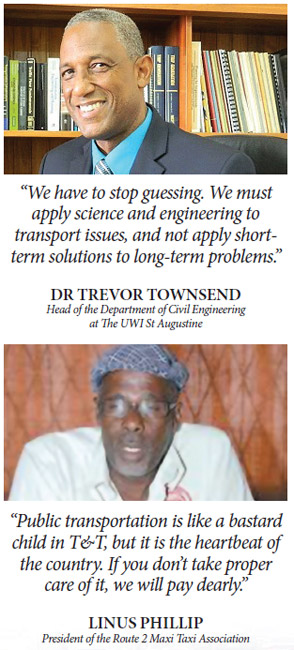
 What is the way forward for transportation in Trinidad and Tobago? A recent conference on the subject presented research, theory, various perspectives – and lots of good intentions. What is the way forward for transportation in Trinidad and Tobago? A recent conference on the subject presented research, theory, various perspectives – and lots of good intentions.
Engineers, researchers, students and policymakers came together to discuss the issue at the Faculty of Engineering on May 15, as UWI’s Civil and Environmental Engineering Department hosted its “Transportation Symposium 2019: Breaking Boundaries, Creating Allies and Uniting Disciplines”.
First to present was Transportation Engineering consultant Dr Rae Furlonge on land-use planning and the economic impacts of transportation in times of financial constraint.
He said the “national interest” when it came to transport issues should not be decided in a cloistered cabinet without reliable information and collaboration between agencies, developers, land owners, etc. He bemoaned a lack of research on the topic and said more consideration should be given to related issues like social interaction and access despite economic situations or mobility.
He said commuters faced a lack of options with transport hubs at times turning into drug dens in the night, putting them at a risk:
“Who does a woman call when she’s standing under the flyover in Chaguanas at 9pm?”
Planning Consultant Ryan Darmanie’s focus was on urban form and how the design of the environment affects society. He discussed factors such as the location of public housing, the issue of fuel subsidies, and the media-propagated image of the ideal home.
He said planning regulations were of the utmost importance in creating urban form, ultimately affecting convenience, safety, and social connection for commuters.
Linus Phillip, President of the Route 2 Maxi Taxi Association said, “public transportation is like a bastard child in T&T, but it is the heartbeat of the country. If you don’t take proper care of it, we will pay dearly.
“We lose many hours in productivity every day because we don’t have a proper transportation system.”
He discussed a lack of infrastructure in residential developments, neglect of rural areas, fuel subsidies as a disincentive to public transport use, and the need to regulate “PH” taxis – illegal private cars being used for hire in underserved areas.
Traffic Engineer Adande Piggott made a presentation for the Ministry of Works and Transport, which described past Government plans and a vision for the future.
He said the development of a National Transportation Plan (NTP), with an 18-month projected timeline, was in the works, but noted that the new initiative was partially based on unrealised goals from transportation plans created since 1967, including a Toco-Scarborough ferry, a new Caroni road, and a fully realised east-west expressway from Port-of-Spain to Valencia.
Several audience members expressed concern that hundreds of millions of dollars were to be invested based on 50-year-old plans that were unlikely to fit today’s needs.
Civil Engineering PhD candidate Leah Wright presented research that revealed a reluctance for car owners to use public transport, finding that comfort and access were significant deciding issues, more so than cost.
SALISES Research Fellow Dr Godfrey St Bernard spoke on the sociology of ground transportation, looking at why people commute, the effects of temporal events, and demographic trends. He said more data should be considered at the planning stage: “We are too reactive.”
He said our “sociological imagination” should be engaged “to prepare for outcomes that may manifest in the future,” such as the effects of artificial intelligence.
Lacey Williams, Managing Director of Caritrans Ltd showed real-life examples illustrating how multifaceted data was needed to solve transport problems. He cautioned against quick fixes: “we can’t solve problems based on anecdotal information, or based on what we think the problem is.”
In summing up, Civil Engineering Head of Department Dr Trevor Townsend expressed concern about the Ministry's NTP.
He said he had lived through the various incarnations of plans for the sector, but had seen none of them come to fruition. He cautioned against trying to “do too many things at the same time without first addressing policy questions”.
Townsend asked what the official Government position was regarding issues such as: access for people with disabilities, the role of taxes vs subsidies, the inter-island link, alternative fuels and hybrid cars.
“We have to stop guessing. We must apply science and engineering to transport issues, and not apply short-term solutions to long-term problems.”
At the same time, he felt there was existing data to support immediate alleviation measures like a “rudimentary bus rapid transport system”.
He advocated for transportation network companies like Uber, which he felt should utilise legitimate taxis.
Townsend urged audience members to reach out and give feedback on transportation issues, noting that his department was in the process of formulating questions for a newly-approved National Household Travel Survey that would shed light on the subject.

Gillian Moore is a writer, editor and singer-songwriter. |





